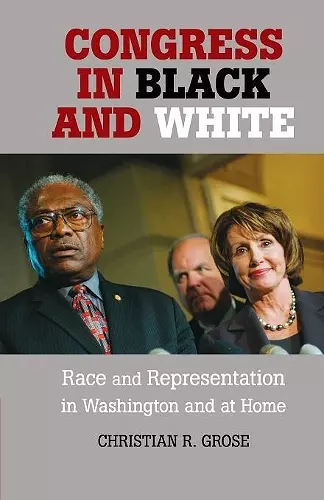Congress in Black and White
Race and Representation in Washington and at Home
Format:Paperback
Publisher:Cambridge University Press
Published:31st Jan '11
Currently unavailable, and unfortunately no date known when it will be back

Provides the first systematic examination of the effect of a legislator's race above and beyond the effect of constituency racial characteristics.
Does the election of African-American politicians matter? Electing black legislators yields more federal dollars and congressional attention directed toward African Americans. Grose is the first to examine an exceptional moment in history in which black legislators – especially in the U.S. South – represented white-majority districts.The symbolic importance of Barack Obama's election is without question. But beyond symbolism, does the election of African-American politicians matter? Grose argues that it does and presents a unified theory of representation. Electing African-American legislators yields more federal dollars and congressional attention directed toward African-American voters. However, race and affirmative action gerrymandering have no impact on public policy passed in Congress. Grose is the first to examine a natural experiment and exceptional moment in history in which black legislators – especially in the U.S. South – represented districts with a majority of white constituents. This is the first systematic examination of the effect of a legislator's race above and beyond the effect of constituency racial characteristics. Grose offers policy prescriptions, including the suggestion that voting rights advocates, the courts, and redistricters draw 'black decisive districts', electorally competitive districts that are likely to elect African Americans.
“Grose shows how African-American and white members of Congress, both in the South and elsewhere, have developed new ways to reach out and respond to constituents of all races. These findings, based on a careful, multi-method research design, provide new, fundamental, and important insights into the role of race in contemporary American politics, the politics of civil rights, and debates over redistricting strategies and the value of majority-minority districts.” —William Bianco, Indiana University
“Armed with fresh interview data and strong statistical approaches, Grose takes on the main controversies in the race and representation literature and offers a new perspective. I was keen to read it.” —Katherine Tate, University of California, Irvine
“The author addresses a complicated array of research areas and questions, and successfully integrates discussion of the theoretical issues that have generally resided within rather than across these subfields. He also incorporates a rich variety of research methods and types of data to explore how substantive representation occurs in Congress. I advise those with an interest in the historical evolution of voting rights law, in the impact of roll call voting, in a review of the multi-layered literature on the growing participation of African-Americans in national legislative representation and issues of substantive representation, in the complex debates about the appropriate strategies for racial redistricting and in the impact of majority-minority districts, to read this book. Grose has successfully integrated his discussion theoretically, methodologically, and empirically across areas that were previously only loosely or in some cases largely unconnected…This is an important book, and it will be widely read and recognized.” - Dianne M. Pinderhughes, Univeristy of Notre Dame, Congress & the Presidency
ISBN: 9780521177016
Dimensions: 215mm x 140mm x 15mm
Weight: 300g
256 pages